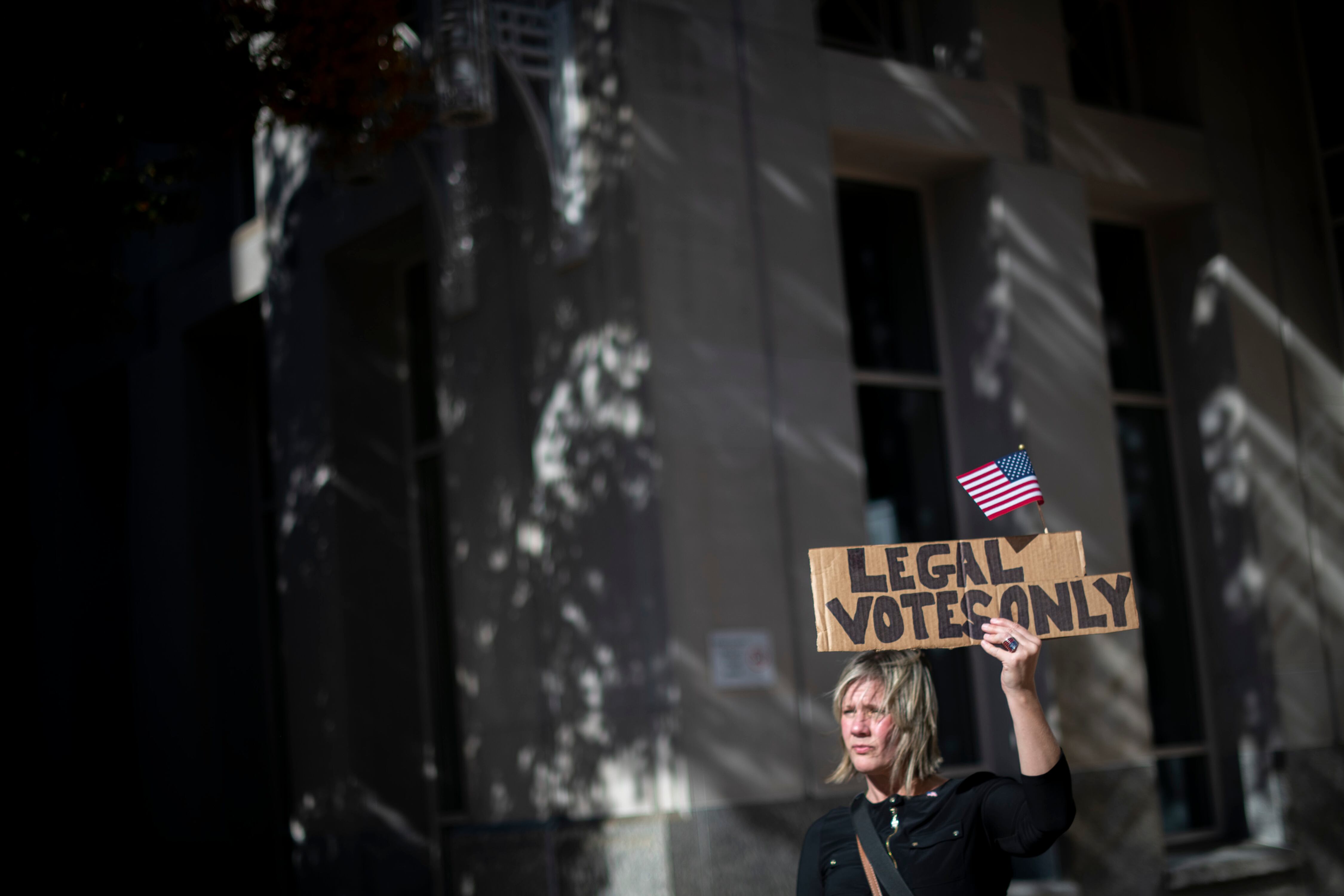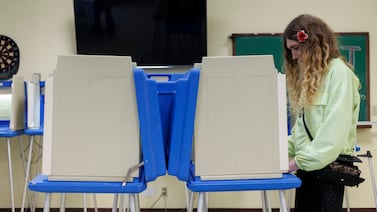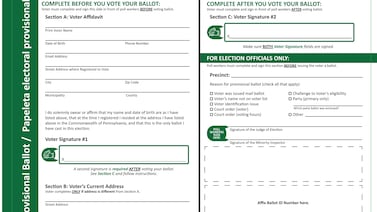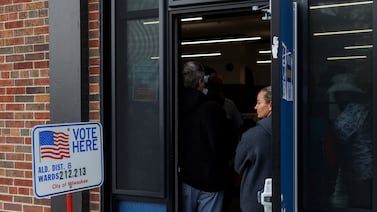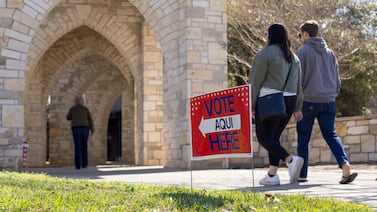A version of this post was originally distributed in Votebeat’s weekly newsletter. Sign up here.
Some Republican election officials running for reelection or for higher office — even those praised for defending the 2020 results in their own states — are firing cheap shots at other states for political points.
It’s a sneaky trick to play to their base by raising vague doubts about nameless other election officials from the insulated safety of one’s own state. And it’s not a victimless attack.
These officials can’t, of course, fully jump on the bandwagon with much of the rest of their party about the outcome of 2020 — after all, they helped administer the election. They can’t make much of a case for their own candidacy if they botched it.
But for many there’s some threading of the needle going on: Elections here were fair and accurate. Elsewhere? Well, I can’t speak to that.
Jan. 6 didn’t just happen because people believed their own state’s election systems weren’t secure. They showed up, often coming from red states that former President Donald Trump handily carried, because they didn’t trust the election systems everywhere else.
Fueling that with this type of campaign rhetoric can only continue to erode trust in the system as a whole.
Take Idaho, where two of the three Republican candidates for secretary of state reject the fact that President Joe Biden was the legitimate winner of the 2020 election. The third? Ada County Clerk Phil McGrane, who administered the election in Idaho’s most populous county. In February, a campaign email bearing his name decried “horrors that were happening elsewhere,” but — of course — not in Idaho.
“Vote counts ‘magically’ changing, transparency nowhere to be found, and massive piles of ballots suddenly appearing from big cities that changed whole states from red to blue before our eyes,” the email said of the 2020 election.
McGrane subsequently told the Spokesman-Review he was shocked by the email and disagreed with it, and that it had been written by a campaign consultant in Utah and sent without his approval.
But McGrane also offered no full-throated defense of his out-of-state colleagues. Instead, he focused on Idaho again. “My opponents have pushed the narrative that Idaho’s elections are insecure and broken and shouldn’t be trusted. And as someone who’s personally worked on the elections here in the state, I want voters to know that their votes count, that our system is secure.” He did not respond to a request for comment.
Frank LaRose, the incumbent secretary of state in Ohio who just won his Republican primary, has also cast aspersions at other states. In an April interview with the Columbus Dispatch, LaRose said it is “fair to discuss that there were things that happened in other states that shouldn’t have happened.” He added, “Would that have changed the results? I don’t know. It’s probably an unknowable thing. Could it have changed the electoral count? Who knows.”
It wasn’t always that way. He took a very different tone in November 2020, telling The Plain Dealer that he had faith in Ohio’s elections — and in “almost all” other states who, he said, run their elections effectively. “If anybody believes that there’s something out there, they need to show evidence,” he said. “Otherwise, making claims without any basis or evidence behind it is problematic.”
Indeed.
Asked for comment, Rob Nichols, a spokesman for LaRose, rejected the idea that LaRose has changed his tone. He “ incessantly talks about the security and accuracy of Ohio’s elections, and Ohioans know this to be true because every election is audited in every Ohio county, typically revealing a 99.9% accuracy rate,” said Nichols.
“Just as he said in November of 2020, he thinks most states got their elections right, but some states lack Ohio’s proven election protocols and controls, which creates a space to invite skepticism in the results, and other states fold on election lawsuits from partisan interest groups, creating additional doubt.”
Nichols did not respond when asked for a specific example of a security flaw LaRose is concerned about in another state.
Those running for office having administered elections are unwilling to impugn themselves, their allies, and their voters, but they seem to have little compunction about throwing other states right under the bus, even without offering evidence of their wrongdoing. It seems the problem is always somehow other people, people who are not like you and who run their elections differently.
Pennsylvanians from far-flung regions of the state have, for years, converged in Philadelphia to watch voters cast ballots and poll workers count them. They seem to think the city, not the areas where they live, is the problem — someone needs to stand witness. And in New Hampshire, tall tales of Massachusetts natives coming over the state border by the busload have long been rampant. This is simply the newest model of a cheap political stunt that has been coming off of campaign factory floors since the beginning of this country.
Idahoan Josiah Colt, who has pleaded guilty to crimes associated with — among other things — swinging from a balcony in the U.S. Senate on Jan. 6, told fellow rioters he was there because election crimes were happening all over the country. Elections, he said, were being stolen. “The whole thing is a scam, dude. The whole election, they can’t just steal an election. Like they are trying to do in Georgia last night. It is a lie,” he allegedly said.
And LaRose, who recently won the Republican primary with help from an endorsement by former President Donald Trump, surely knows that nearly 40 Ohioans were arrested after participating in a failed insurrection. “The violence and flagrant disregard of the law at the U.S. Capitol is un-American. It goes against our values as a nation. There’s no excuse for it. None,” he tweeted on that day. “Those bent on violence and destruction should leave so the work of our elected officials may continue.”
But since then, he’s ratcheted up his language. Trump, he now says, has a point about voter fraud — just not in Ohio. But the 40-some Ohioans who caused mayhem that day were not there because they believed LaRose, specifically, was corrupt. Or that their own local election officials were.
Polls show that American voters are far more likely to have confidence in their own election processes than their state as a whole, and they have remarkably less confidence in states they don’t live in. The MIT Elections Project, based on polling conducted after the 2020 election, found that “35% were very confident that votes would be counted as intended in their own county or community,” but that “these percentages dropped to 29% and 15% when the question asked about the state and the nation, respectively.”
This is a shame, and those running for office know better than to score cheap points at the expense of their colleagues. More than ever before, state and local officials can say with confidence that elections run in other places are secure. Since elections were declared “critical infrastructure” in the final weeks of the Obama administration, local officials have increasingly shared data, threat assessments, and success stories in a way that was unheard of even five years ago. They go to conferences with each other — I know, I also go to them — and talk to each other on email listservs — I know, I file a lot of public records requests.
And so, suspicion-casting officials: I know that you know that elections elsewhere are, largely, secure. And I know that you know you shouldn’t let your voters live in a world where they falsely believe the elections you run are fine, but those run by your colleagues might not be nearly so trustworthy.
Election officials are kidding themselves if they believe they can be a bulwark against the erosion of democracy by impugning people who do the very same job they do. Truth shouldn’t stop at your state line.
Back Then
This is far from the only time the American people have shown declining trust in elections and democracy. In the late 1800s, the prohibition movement, the activism of suffragettes, and increasing anti-immigrant hostility combined to produce declining faith in government among America’s ruling class, who were concerned they were watching their own power diminish. Also, they missed booze. “At the bottom of this opposition is a subtle distrust of American institutions, an idea of ‘restricted suffrage’ which is creeping into our republic through so-called aristocratic channels,” wrote Harriette R. Shattuck, a Massachusetts suffragist, in 1884.
In Other Voting News
- Denise Clay-Murray, our Pennsylvania reporter, is out with her first story: It’s not quite clear when we’ll have final results in Pennsylvania, where pre-canvassing of mailed ballots is not allowed. While many counties will begin tabulating returned ballots (more than 900,000 have been requested) at 7 a.m. on Election Day, it’s not clear how long that process will take, and some counties won’t start counting until the next day.
- York County, Penn., ran out of ballots in 2021. Local news network WHTM does a great explainer on what the county has done to prevent that from happening again.
- More Pennsylvania news: GOP ward leader Billy Lanzilotti in Philadelphia has been ousted by his fellow Republicans after redirecting dozens of mailed ballots to a post office box he controlled. According to the Philadelphia Inquirer, many of the voters “had no idea why their ballots were being sent to Lanzilotti instead of their home addresses. Some maintained they had never even applied to vote by mail.”
- The House select committee on the Jan. 6 attack has taken the unprecedented step of subpoenaing five Republican representatives, including House Minority Leader Kevin McCarthy. Reps. Jim Jordan of Ohio, Scott Perry of Pennsylvania, Andy Biggs of Arizona and Mo Brooks of Alabama were also subpoenaed. All five men were asked to provide the committee with documents related to the events of Jan. 6, but have so far refused.
- Emails obtained through public records requests by the New York Times show controversial conservative lawyer John Eastman went to even greater lengths than previously known to swing 2020 for Trump. The Times reports Eastman “pressed a Pennsylvania state lawmaker in December 2020 to carry out a plan to strip Mr. Biden of his win in that state by applying a mathematical equation to accepting the validity of mail ballots.”
- You have probably, by now, heard of that 2000 Mules movie — the brainchild of Dinesh D’Souza and nonprofit group True the Vote — which used unverified cell phone data to accuse thousands of people of committing “ballot trafficking.” The AP has a great fact check of it. So does the Washington Post.
- On Thursday, Florida Secretary of State Laurel Lee announced she was vacating her post with less than seven months until the midterm elections. She did not specify a reason for her departure, but news organizations reported she intends to run for Congress.
- The Michigan secretary of state’s ongoing investigation into counties that allowed unauthorized third parties access to voting systems has expanded into Barry County. The county had its election offices raided by the Michigan State Police in late April.
- Isabel Longoria had a busy week in Texas: Lawmakers within the House Elections Committee heard from the recently resigned elections chief in Harris County over the delays in the county’s recent primary election results, and the Texas Supreme Court heard oral arguments in Paxton v. Longoria, a lawsuit challenging the state’s ban on the promotion of mail-in voting by election officials.
- Michael Gableman, the former Wisconsin state supreme court justice now running an investigation into the state’s 2020 election, will continue to be paid $5,500 a month even while the investigation is stalled due to legal battles.
- Election officials in Missouri (stop me if you’ve heard this before) say the state is running out of time to pass a redistricting map they can actually implement.
Good Idea of the Week
The Miami County, Kansas, clerk’s office is holding an “Elections 101” course for the public on May 25. After a presentation, voters can ask questions and will be invited to cast a “fun” ballot. Round of applause for Clerk Janet White, who is hosting this event for the first time since 2016. More of this, please!
Jessica Huseman is Votebeat’s editorial director and is based in Dallas. Contact Jessica at jhuseman@votebeat.org.

